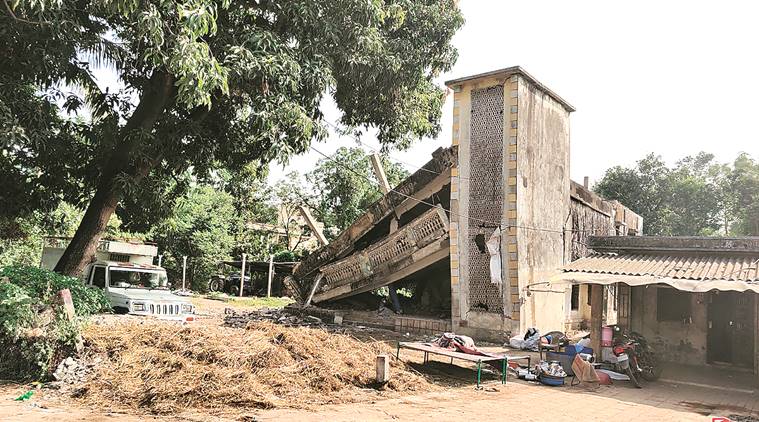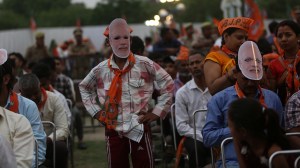- India
- International
Dadra & Nagar Haveli: Farmers stare at loss as bullet train set to zip through fertile land
As the new Maharashtra government announced a review of the project and farmers, organised under Khedut Samaj, Gujarat (KSG), have moved the Supreme Court against the amended land acquisition law, The Indian Express travelled along the route, listening to the farmers.
 Demolished house of Milan Solanki at Naroli village in Dadra and Nagar Haveli. (Express Photo)
Demolished house of Milan Solanki at Naroli village in Dadra and Nagar Haveli. (Express Photo)
Dadra and Nagar Haveli (DNH), a Union Territory (UT) in South Gujarat, almost the size of Ahmedabad, will get its first railway station when bullet train becomes a reality. Residents of DNH and the other UT, Daman, travel around 20 kilometres to catch a train from Vapi. But the facility will come at a price — of several orchards of juicy Alphonso mango and paddy fields.
As the new Maharashtra government announced a review of the project and farmers, organised under Khedut Samaj, Gujarat (KSG), have moved the Supreme Court against the amended land acquisition law, The Indian Express travelled along the route, listening to the farmers.
Two weeks ago, Mohan Singh Solanki (75) saw his ancestral home in Vadfalia in Naroli village go under the sledgehammer as it was on the bullet train alignment area. The Solankis got Rs 3.06 crore as compensation for the house measuring around 500 square feet, on two acres of land, two months ago, which they claim would actually cost Rs 6 crore. Their 15 adult Alphonso mango trees and paddy fields went along with the house.
Solanki bought two flats in an apartment building in the same village where he moved in with his son Hari Singh and his family.
Hari Singh says, “We have surrendered before the government as we knew we would not win against it. A month ago, officials turned up at our house and told us to vacate the bungalow as they wanted to demolish it. We demanded 15 days time to purchase the flats and shifted with all our belongings. I requested the mamlatdar and bullet train officials to allow us to demolish the house as our sentiments are attached to it. When we did it around two weeks ago, we were in tears. Now we live in a smaller space.”

He adds that though they wanted to buy some land with the compensation amount, there was no land left in the village to buy. Hari claims they got Rs 5 lakh per guntha (per 30 square metre) while the market rate was between Rs 10-15 lakh. Now they have 20 gunthas remaining in which they plan to continue farming.
Around the same time, a team of revenue officials accompanied by National High Speed Rail Corporation Ltd (NHSRCL) demolished the house of farmer Bhagwan Singh Rathod, 63, in Tekri falia in DNH. His wife Ramiben, son Kiran and his wife Pooja, and their two children moved to a temporary house nearby.
“I had a total of 24 gunthas of farming land of which the officials acquired four gunthas equalling my entire house. We are searching for a new house, else we will build another in the remaining farm land with the compensation money (Rs 65 lakh),” says Rathod.
The project will also claim 70 per cent of the Haveli petrol pump premise owned by partners Fatehsinh Chauhan and Jitensinh Chauhan on the main road connecting Bhilad in Valsad district to Naroli near Silvassa, the DNH headquarter.
Jiten told The Indian Express, “Around 9,000 square feet of the one-acre land of our petrol pump is in the bullet train project area. Here the jantri (ready reckoner for market value) rate is Rs 250 per square feet and the officials calculated the land value and business losses and told us that they will give around Rs 5 crore, which will not cover our business losses.” He says the pump runs 24/7 and their annual turnover is over Rs 100 crore of which one-fourth went in tax.
“Now if we get money from the government, we cannot purchase land as the adjoining land is not for sale and the one behind is farm land. If we shift it farther, then we will lose business as there are over 25 petrol pumps in Silvassa,” he says. The area acquired has been marked as owners wait for demolition and compensation.
Not all farmers have parted with their land peacefully. Dharmesh Singh Rathod and Milan Singh Solanki have their land in Tekri falia and Navi falia respectively in Naroli. The Rathod property has a sign that forbids trespassing and names Ranjeet Singh Rathod as the owner. Ranjeet is Dharmesh’s cousin and was to get the compensation from the NHSRCL for the land acquired but the Silvassa court stayed the process, on a petition filed by Dharmesh.
According to Dharmesh, the 4.50 guntha land has 10 Alphonso mango trees and paddy fields where they were farming. He says that his late father Prabhat Singh entered a deal with his late sister, Dahiben, who wanted land close to their home in exchange of hers which was farther away. According to the agreement signed by Dahiben and her three sons — Ranjeet being one of them — Prabhat’s son would get 4.5 gunthas near the main road. But Dharmesh alleges Ranjeet got the government records (called saat/baar utaro) altered and registered himself as the owner. This land now went for the bullet train project.
“Ranjeet was called and procedure for compensation was started. We objected before the Silvassa Collector saying that the land was ours and that it was a mutual deed between our father and his sister for exchanging a part of land. We have got possession of the land and even signed documents of affidavit of our aunt with her three sons. The Collector gave order as per the 7/12 records, the land is owned by Ranjeet singh so the compensation amount should go to him. We objected to the order and filed litigation with the court a few months ago. On August 20, we got stay order from the Silvassa court and we have sent its copy to Collector and bullet train officials. In the last hearing on November 18, the court directed the Collector to produce the documents by December 18. We are prepared to to go higher courts,” says Dharmesh.
In Navi Falia, Solanki claims to have bought land from a tribal, Praveen Chaudhary, years ago and built a two-storey farmhouse. He was farming in the remaining land. Now, some part of his land and bungalow go to the bullet train project. Solanki got a compensation of nearly Rs 1 crore. Chaudhary has now challenged the compensation in court.
“I have all the necessary documents of the land and we will fight in the court against the tribal. Let the court decide,” says Solanki.
Another case in the Silvassa court is of Mangla Solanki (65), a resident of Dhapsa village near Naroli, who lost her house and farm land to the bullet train project. She was given a compensaion of Rs 15.75 lakh. Having no children, she has a dispute with her brothers-in-law. A week ago, her home was demolished and she moved in with her sister Veenaben in Naroli.
Speaking to The Indian Express, Mangla said, “When my husband Gaman was alive, his father distributed land among his four sons — Ranjeet, Kanti, Dhiraj and Gaman in 1994. We got farmland of six gunthas. The bullet train officials measured our land on the project route and took out details from government records, which reflects names of all four brothers on our plot. My father-in-law had separate share to each son but that is not in the government’s land ownership record (saat/baar utaro). They have now come to claim the land. I have filed a case in Silvassa court for justice.”
In Dhapsa village on state border, a series of 23 houses built for Halpati (OBC) and tribals under the Indira Awaas Yojana has been marked to be demolished. Bhanu Jeena Warli, farm labourer, said, “After officials carried out measuring of the land, we contacted our elected DNH MP Mohan Delkar (independent), and requested him to intervene and told him that we want land in a nearby area as compensation. If they give us land at far places, our livelihood as well as our children’s education will be affected.” Each of the houses was built on two guntha each.
At Bori village in Umargaon taluka of Valsad district, 20 farmers will lose three acres of their farm land where over 90 per cent of the farmers have agreed to part with their land.
Ketan Nandvana of Bori village, who completed MCom, said, “When the bullet train officials came to measure the land, we first talked to them and they told us that they will give four times the jantri rate (that is, four times of 585 per square metre), which is equal to the market value of the land, so majority of the farmers agreed to give their land in our village and there was no protest.” Nandvana is a member of KSG.
The Gujarat High Court recently dismissed a set of 59 petitions filed by the KSG, upholding the land acquisition process, but keeping the issue of compensation open where KSG had demanded four times the market rate.
Under the KSG banner, over 150 affected farmers mostly from south Gujarat, filed petitions before Gujarat High Court in 2018. In the petition, the farmers pleaded that as the project covered the states of Gujarat, Maharashtra and Union Territory of Dadra and Nagar Haveli, the land acquisition should be done under the Land Acquisition Act of the Union government.
In Achari village of Umergaon, majority of the farmers are unhappy with the compensation and are still protesting. Mehul Shah, 35, who has a post-graduate law degree and is 70 per cent physically challenged, has lost half of his six acre land to the project.
“My land is just two kilometres from NH 48 and has a market value of Rs 75-80 lakh per acre. My father passed away three years ago and I am the only child. We have 74 Alphonso mango trees and we export mangoes to the United Kingdom, and the Middle East and sell in the local market. Annually we earn Rs 25 lakh from mangoes, apart from which we also have paddy fields,” said Shah.
He argues that while in Bori village next door the base price is Rs 582 per square metre, in Achari, it is Rs 91 per square metre, which is as per jantri rates of 2011. “We are at a major loss and are protesting. They have calculated and told us that we will get a compensation of Rs 20 lakh as per jantri rates. The officials also counted the number of trees and till now they have not disclosed how much they will pay compensation amount of each tree. My two cousins Hitesh and Chirag also will lose half an acre each which also has Alphonso mango trees.”
Apr 25: Latest News
- 01
- 02
- 03
- 04
- 05







































